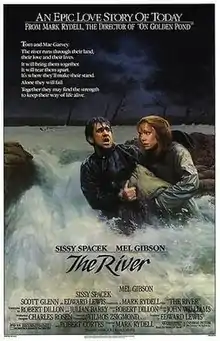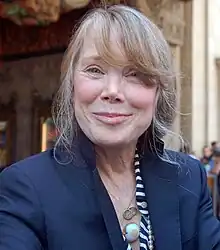The River (1984 film)
The River is a 1984 American drama film directed by Mark Rydell, written by Robert Dillon and Julian Barry, and starring Sissy Spacek, Mel Gibson, and Scott Glenn. The film tells the story of a struggling farm family in the Tennessee valley trying to keep its farm from going under in the face of bank foreclosures and floods. The father faces the dilemma of having to work as a strikebreaker in a steel mill to keep his family farm from foreclosure. It was based on the true story of farmers who unknowingly took jobs as strikebreakers at a steel mill after their crops had been destroyed by rain.
| The River | |
|---|---|
 Theatrical release poster | |
| Directed by | Mark Rydell |
| Written by |
|
| Produced by |
|
| Starring | |
| Cinematography | Vilmos Zsigmond |
| Edited by | Sidney Levin |
| Music by | John Williams |
| Distributed by | Universal Pictures |
Release date | December 19, 1984 |
Running time | 123 minutes |
| Country | United States |
| Language | English |
| Budget | $18 million[1] |
| Box office | $11.5 million (North America)[2] |
The River was theatrically released on December 19, 1984, by Universal Pictures. It received mixed reviews, with critics praising Spacek's performance and the cinematography, but criticizing the screenplay, execution, and Gibson's performance, whom many considered to have been miscast. It was a box office failure, grossing only $11.5 million against an $18 million budget. Despite that, it received four nominations at the 57th Academy Awards; Best Actress (for Spacek), Best Original Score, Best Sound, Best Cinematography, and won the Special Achievement Award.
Plot
Tom and Mae Garvey are a hard-working couple living with their two children on the east Tennessee farm owned by Tom's family for generations. They and many of their neighbors have hit hard times as of late. A downturn in the economy has led to dwindling land prices.
Their biggest problem has been that their crop land has been prone to flooding as the property is adjacent to a river. Manipulating the powers that be include local senator Neiswinder and the local bank. Joe Wade, who also grew up in the area and now runs the local milling company that sets the local grain prices, is secretly working to buy up the properties along the river so he can build a dam. The dam would generate electricity but more importantly for Wade, it would provide irrigation opportunities for farm properties away from the river, such as his own.
Wade's maneuverings coupled with many other farming problems makes it increasingly difficult for Tom and Mae to hold on to their farm. Tom is determined at any cost stay on the land of his ancestors. Through his cousin, Tom begins work at a steel factory in order to prevent foreclosure on his farm, only finding out he's a strikebreaker as they're crossing the picket lines. Work in the mill is incredibly hard, the conditions are tough and pay is meager.
The rest of the Garvey family is left alone while Tom is away working. Mae is involved in an accident on the farm where she loses a lot of blood and almost her arm. Some time later, Tom invites his family to come visit him in the city where he and Mae compare how things are going in their daily lives now spent apart. The strike ends, but as part of the returning workers' deal, the strike breakers must walk out of the factory without the protection they had when entering. Instead of an all-out fight, the workers and scabs observe one another, recognizing each others' desperation before the workers begin shaming the scabs.
Tom returns to the farm and is pleased with the crops but Wade has Tom's corn inspected. Wade offers less than what the crop cost Tom to plant which leads to a confrontation where Wade reveals his plans for a hydroelectric dam and the redevelopment of Tom's land. Tom returns to the farm where is machinery is failing and another flood threatens the farm.
An exhausted Mae finally confronts Tom over his stubbornness, as he is continuing to fight a losing battle with Wade and the river. The farming community bands together to build a levee providing some relief. Wade arrives with a truck full of bankrupt farmers intent on dismantling the levee for cash. Wade offers the farmer's on Tom's side a bonus if they sabotage the levee. Tom pleads with both sides, many of whom were in Tom's shoes but lost their farms, however the levee is breached and the floodwaters flow in. Despite all of this, Tom begins picking up sandbags to repair the levee alone. Inspired by his dedication, his family and eventually, the onlookers help Tom repair the levee. Wade realizes he's lost the battle and admires Tom's determination, but points out that sooner or later nature will upend Tom's farm and Wade will be waiting.
The Garvey family has a successful harvest.
Cast
- Sissy Spacek as Mae Garvey
- Mel Gibson as Tom Garvey
- Shane Bailey as Lewis Garvey
- Becky Jo Lynch as Beth Garvey
- Scott Glenn as Joe Wade
- Don Hood as Senator Neiswinder
- Billy "Green" Bush as Harve Stanley
- James Tolkan as Howard Simpson
- Jack Starrett as foreman Swick
Production
Director Mark Rydell viewed the characters in this drama as iconicly American, and he was eager to cast Sissy Spacek as the farm wife because of her performance in Coal Miner's Daughter and her home on a farm near Charlottesville, Virginia. Rydell said, "She is the consummate American rural young woman, with strength and fiber and a luminous quality." Mel Gibson begged Rydell to let him play the Tennessee farmer who reminded him of his father, but the director was reluctant because of Gibson's Australian accent. Before Gibson left for England to film The Bounty, he begged Rydell not to cast the part yet. Rydell recalled, "He came back to my house in Los Angeles and started reading the script, talking, reading the newspaper, in this perfect Tennessee accent. I was really impressed, even when he stood next to Sissy, who's like a tuning fork when it comes to accents, he had damn well done it."
The River was filmed in the Holston Valley area of Church Hill, Tennessee. The filmmakers purchased 440 acres (1.8 km2) along the Holston River for the farm set and planted corn. Most of the filming was done along Goshen Valley Road and around the Goshen Valley Park area. Goshen Valley Road heads south from highway 11W in Church Hill, Tennessee. The cast and their families moved to the area a month before the start of production to connect with the local people and learn farming skills. The floods in the film were supplied by the Tennessee Valley Authority and the Army Corps of Engineers with water from the Fort Patrick Henry Dam. The bank and downtown scenes were filmed in the town of Gate City, Virginia. The tent city and a few other scenes were filmed in Kingsport, Tennessee, while some factory scenes were filmed in Birmingham, Alabama. Scenes that were filmed at Double Springs Baptist Church in Jonesborough, Tennessee did not make the final cut of the movie. The film was completed for under $18 million.[3][4]
Music
The musical score was composed and conducted by John Williams and also featured songs by country artists including George Strait.
It was announced that Intrada Records will release an expanded and remastered version of Williams' score on May 5, 2020.[5] The new release will feature the complete score (including previous and unheard content) and the original soundtrack album.
Reception

The River was the last of three 1984 films, including Country and Places in the Heart, that shared the themes of a family's devotion to their farm, the destructive force of nature, an unsympathetic bureaucracy and a determined woman who binds her family together.[6]
The film received negative reviews, with praise for Sissy Spacek's performance being a notable exception.[7][8] On Rotten Tomatoes, it holds an approval rating of 24% on Rotten Tomatoes from 21 critics.[9] Mel Gibson later regretted that his portrayal of Tom Garvey was so stubborn that the audience lost sympathy, and said that he had been miscast for the role because he was too young and "pretty" at the time.
The film opened Wednesday, December 19, 1984, in 3 theaters and grossed $40,540 in its first seven days to Christmas Day[10] and went on to gross $11.5 million in the United States and Canada.[2]
Awards
The film was nominated for Academy Awards in Best Actress in a Leading Role (Sissy Spacek), Best Cinematography, Best Music, Original Score and Best Sound (Nick Alphin, Robert Thirlwell, Richard Portman and David M. Ronne).[7] It also received a special Oscar for sound effects editing (Kay Rose).
References
- Rydell hopes 'The River' will be another hit farmland saga: Director Rydell is proud of 'The River' Thomas, Bob. Chicago Tribune 4 Jan 1985: f15c.
- The River at Box Office Mojo
- Ester B. Fein (December 16, 1984). "How "The River" Came to the Screen". The New York Times.
- Bob Thomas (December 27, 1984). "U.S. Film Maker Casts Dubbed Voices in His Films". Associated Press.
- "Intrada Soundtrack Forum • View topic - Coming on 5/5".
- Roger Ebert. "Review of The River". Chicago Sun-Times. Retrieved September 2, 2009.
- "The 57th Academy Awards (1985) Nominees and Winners". oscars.org. Archived from the original on December 28, 2011. Retrieved October 13, 2011.
- Crockett, Lane (13 January 1985). "Spacek means talent". The Times. p. 94. Retrieved 1 March 2023.
- "The River". Rotten Tomatoes.
- Greenberg, James (December 27, 1984). "'Beverly Hills Cop' Top Ticket At National B.O.; 'Pinocchio' Strong". Daily Variety. p. 4.
External links
- The River at IMDb
- The River at the TCM Movie Database
- The River at Letterboxd
- The River at Rotten Tomatoes
- The River at Box Office Mojo